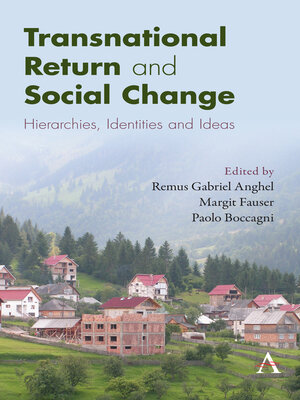Transnational Return and Social Change
ebook ∣ Hierarchies, Identities and Ideas · Key Issues In Modern Sociology
By Remus Gabriel Anghel

Sign up to save your library
With an OverDrive account, you can save your favorite libraries for at-a-glance information about availability. Find out more about OverDrive accounts.
Find this title in Libby, the library reading app by OverDrive.



Search for a digital library with this title
Title found at these libraries:
| Library Name | Distance |
|---|---|
| Loading... |
Return has long been considered the end of a migration cycle. Today, returnees' continued transnational ties, practices and resources have become increasingly visible. Transnational Return and Social Change joins what is now a growing fi eld of research and suggests new ways to understand the dynamics of return migration and the social changes that come along. It pays tribute to the meso-level impacts that follow the practices and resources migrant returnees mobilize across borders. With a particular focus on the meso-level the book takes up the challenge of transnational research and enquires into the consequences of return for local communities, organizations, social networks and groups. Presenting a collection of case studies dedicated to migrations across Europe and beyond, this book contributes new insights into the societal impact of migration in pluralized societies.
|In the past years, in a general context featured by anti-migration discourses in immigration countries, sustained economic growth in countries of origin and mobility between migrants' countries of origin and destination, research on return migration started flourishing.
Return has long been considered the end of a migration cycle. Today, returnees' continued transnational ties, practices and resources have become increasingly visible. 'Transnational Return and Social Change' joins what is now a growing field of research and suggests new ways to understand the dynamics of return migration and the social changes that come along. It pays tribute to the meso-level impacts that follow the practices and resources migrant returnees mobilize across borders. It argues for the need to study the dynamics and impact of return migration by involving also more mundane forms of change, arguing that everyday processes and small-scale changes are as important as the macro-transformations for understanding the societal impact of migration.
This volume thus inquires about the consequences of return for local communities, organizations, social networks and groups, focussing on the changes in social hierarchies, collective identities and cultural capital, norms and knowledge. It presents case studies of migration flows that connect Germany to Turkey, Romania and Ghana, the United Kingdom to Poland, multiple Western countries to Latvia as well as inner-African movements. Against this background, the book contributes new insights into the transnational dynamics of return migration and their societal impact in pluralized societies.







